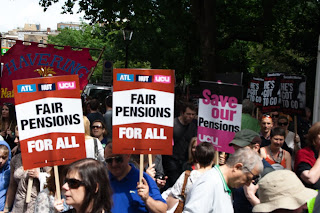 Is the Pope a Catholic? Do bears shit in the woods? Are the SWP calling for a General Strike?
Is the Pope a Catholic? Do bears shit in the woods? Are the SWP calling for a General Strike?
Some questions we instinctively know the answer to and
Marxism 2011 – the SWP’s annual political conference – was saturated with the familiar calls for a General Strike. Instead of
The Boy Who Cried Wolf, it’s
The Marxist Who Cried General Strike. And both exclamations – repeated ad infinitum without foundation – quickly lose any relevance or significance.
But this time it’s different and last Thursday – on the same day as mass strikes in the public sector – Mark Campbell – a UCU union rep and SWP member – told
Marxism’s opening rally that “the call for a General Strike is no longer an abstract slogan”.
Campbell’s proclamation was met with rapturous applause and a spontaneous rendition of
One Solution Revolution – but it does give a fascinating insight into SWP tactics. Were they aware that all their previous calls for a General Strike were abstract demands?
A General Strike cannot come through decree, it must evolve through the inclusion of more and more workers and the involvement of more and more struggles. If workers are going to embark on a long and bitter industrial dispute, they need to be assured in their fight and possess a heightened consciousness – they can’t simply be following orders or abstract slogans.
There are a number of concrete reasons why calling for a General Strike is a tactical error. Firstly, there is the legal issue which – because unions cannot strike in sympathy or for political reasons – means a General Strike is illegal. Secondly – and closely linked to this – is the problem with public perception. Pervasive mainstream media hostility to trade unionism has created an insidious opposition to the prospect of strike action which can only be countered incrementally from the bottom-up. Different conflicts, issues and disputes in different trade unions have to be addressed simultaneously with action being co-ordinated locally and nationally on the same days. This, in effect, would represent a General Strike but the SWP’s radical rhetoric fuels the fire of a reactionary media and serves to alienate many workers who would otherwise sympathise with the struggle.
The
Marxism festival illustrates that the SWP suffers from a number of intellectual inconsistencies and, one assumes, it comes from the problematic concept of democratic centralism. On the one hand, the SWP criticise the Soviet Union and Cuba for being top-down but, on the other, the central committee issue General Strike diktats to the British labour movement. On the one hand, they criticise the post-war Labour government for bourgeois collaboration and dismiss the welfare state and state control as distractions from building revolutionary socialism but, on the other hand, they claim to lead the fight against public sector cuts and privatisation. As Maxine Bowler said at a seminar on the USSR: “capitalism will use all sorts of strategies to make sure it maintains itself”. So why defend social democracy which curbs revolutionary zeal? Surely, from an SWP perspective, the best way to achieve proletarian revolution is from the most cut-throat and ruthless capitalism?
The true beauty and fascination of
Marxism, however, lies not in the inconsistencies of SWP dogmatism but in the wealth of eminently reasonable and inspiring non-SWP speakers it attracts – whether it’s Jeremy Corbyn championing the progressive governments of Cuba, Venezuela and Bolivia, Richard Wilkinson with his empirical dissection of inequality or Tariq Ali denouncing the obsequious acquiescence of Ed Miliband to Tory monetarism. It’s about the myriad of left-wing eccentrics it attracts – whether it’s the International Bolshevik Tendency heralding North Korea or the Workers Revolutionary Party starting a near-brawl. If the SWP can attract thousands of activists to a festival on revolutionary socialism, just think how many more can be attracted to a broad and inclusive movement against government cuts. Now if only the Labour Party would play ball...
 Today the Times had the unfathomable gumption to run the above cartoon – under the headline ‘Priorities’ – in a brazen attempt to divert attention from the phone-hacking scandal to the issue of famine in Somalia. What an incredulous and cynical piece of posturing by the Murdoch Empire!
Today the Times had the unfathomable gumption to run the above cartoon – under the headline ‘Priorities’ – in a brazen attempt to divert attention from the phone-hacking scandal to the issue of famine in Somalia. What an incredulous and cynical piece of posturing by the Murdoch Empire!



